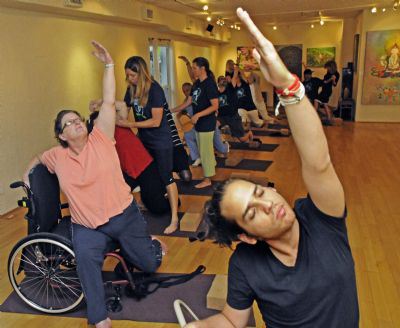
BY: SOPHIA VOUMVAKIS
After sustaining a traumatic brain injury (TBI) in 2011 I was blessed to be referred to a wonderful cccupational therapist who helped me to firstly understand what had happened to me, secondly, helped me to develop strategies to deal with my deficits, and finally helped me to accept my new normal.
We focused on three areas during my therapy: cognitive, emotional, and physical. Recently I read a scientific article published in Current Opinion in Behavioral Sciences which outlines the extensive neuroscience literature that supports the positive effects of physical activity for improved cognitive performance and brain health.
Experiments with animals have shown that increased physical exercise leads several benefits to the brain, including:
- the birth of new neurons in the hippocampus (which is involved in forming, storing, and processing memory)
- increased connections among neurons throughout the brain (in earlier posts we have discussed how neurons communicate by sending electrical signals to each other that allow us to carry out cognitive functions)
- the development of new blood vessels
- increased production of neurotrophic (nerve) proteins
- the reduction of proteins associated with neurodegeneration in mouse models of Alzheimer’s disease
- enhanced learning and memory
These findings have been observed across the lifespan and in a multitude of species, including rodents, dogs, and monkeys. The findings in animal models provided the basis for human studies of physical activity, fitness, and exercise and its impact on brain function. In a
meta-analysis (a quantitative statistical analysis of several separate but similar experiments or studies in order to test the pooled data for statistical significance) of eighteen human randomized controlled trials published in 2013 by Colcombe and Kramer, a moderate effect size between exercise and cognition was reported.
Specifically, the meta-analysis revealed a clear and significant positive effect of aerobic exercise training on cognitive function. As discussed in an earlier post, TBI often leads to deficits in cognition – attention, memory, thought, behaviour and emotion.
Furthermore, exercise training had both general and selective effects on cognitive function. Although exercise effects were observed across a variety of cognitive tasks, the effects were largest for tasks that engage the central executive network, including planning, problem solving, cognitive flexibility, and working memory. Lastly, the meta-analysis revealed that aerobic exercise training combined with strength and flexibility training had a greater positive effect on cognition compared to exercise training programs that included only aerobic components.
More recently, human studies have begun to include measures of brain function and structure along with behavioural measures of cognition. These studies have reported that relatively brief fitness programs result in increased brain volume in the hippocampus, benefits in the striatum, and increases in the integrity of white matter tracts. Additionally, these fitness programs enhance patterns of brain activation, including measures of functional connectivity of frontal and parietal brain regions, suggesting more efficient activity within the central executive network.
While the majority of experiments have focused on older adults, more recent studies have reported similar cognitive and brain benefits of exercise and physical activity in children, and young adults. Collectively, these studies have demonstrated that physical activity and aerobic fitness benefit brain function and cognitive performance across a variety of aspects of cognitive control, including attention and inhibition, working memory, mental flexibility, and action monitoring/error detection, as well as hippocampaldependent memory.
Despite the global benefits of physical activity and the potential to improve cognitive performance and brain health, remarkably little research has evaluated the effects of physical activity on cognition following TBI.
Consistent with the literature in healthy adults, evidence indicates that physical activity in a four-week aerobic fitness intervention produced improvement in executive functions following TBI.
The physical fitness interventions for TBI can be personalized for the patient, selecting from a variety of fitness activities (e.g., aerobic, strength, and flexibility training) that accommodate the patient’s abilities and functional goals.
Mine include hiking, biking, yoga, swimming, snowshoeing, and strength training. Activities that I had always enjoyed and continue to enjoy which benefit both my body and my brain!
Since her TBI in 2011, Sophia has educated herself about TBI. She is interested in making research into TBI accessible to other survivors.




